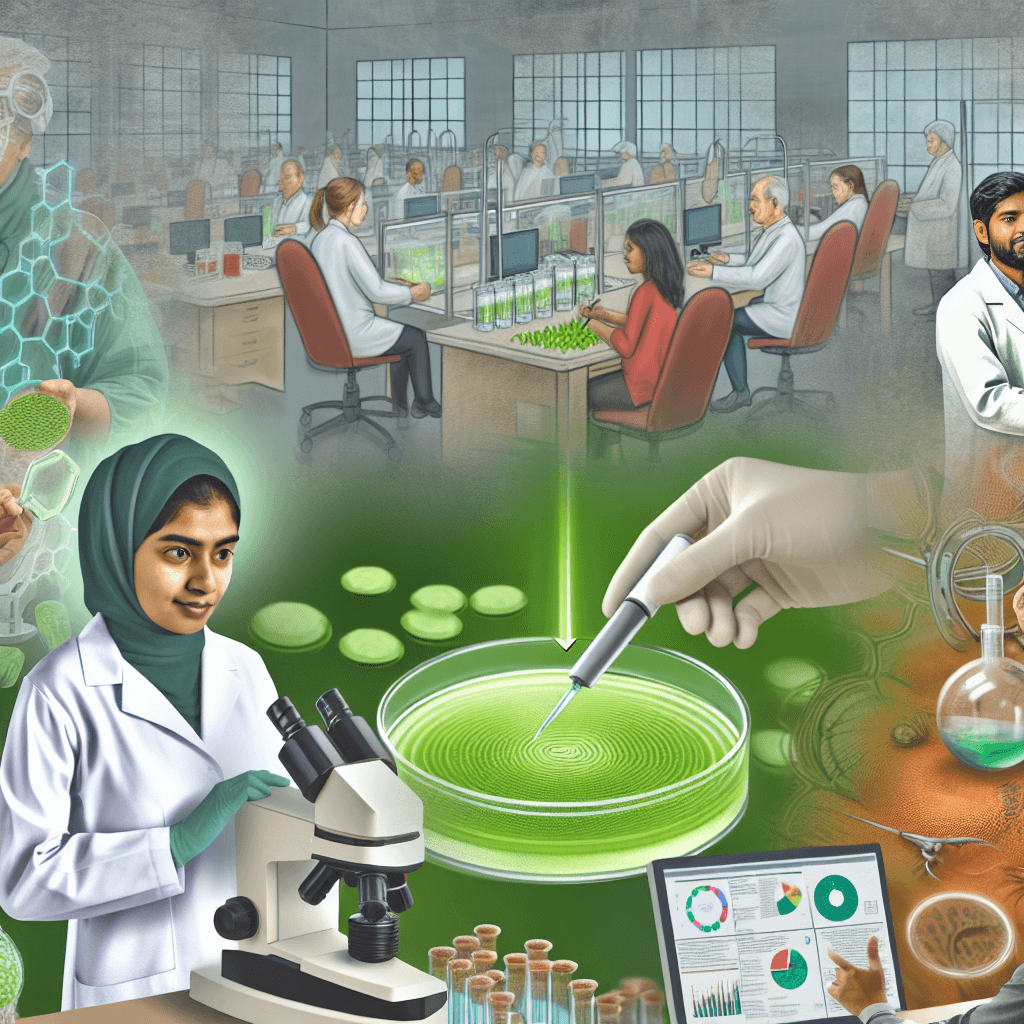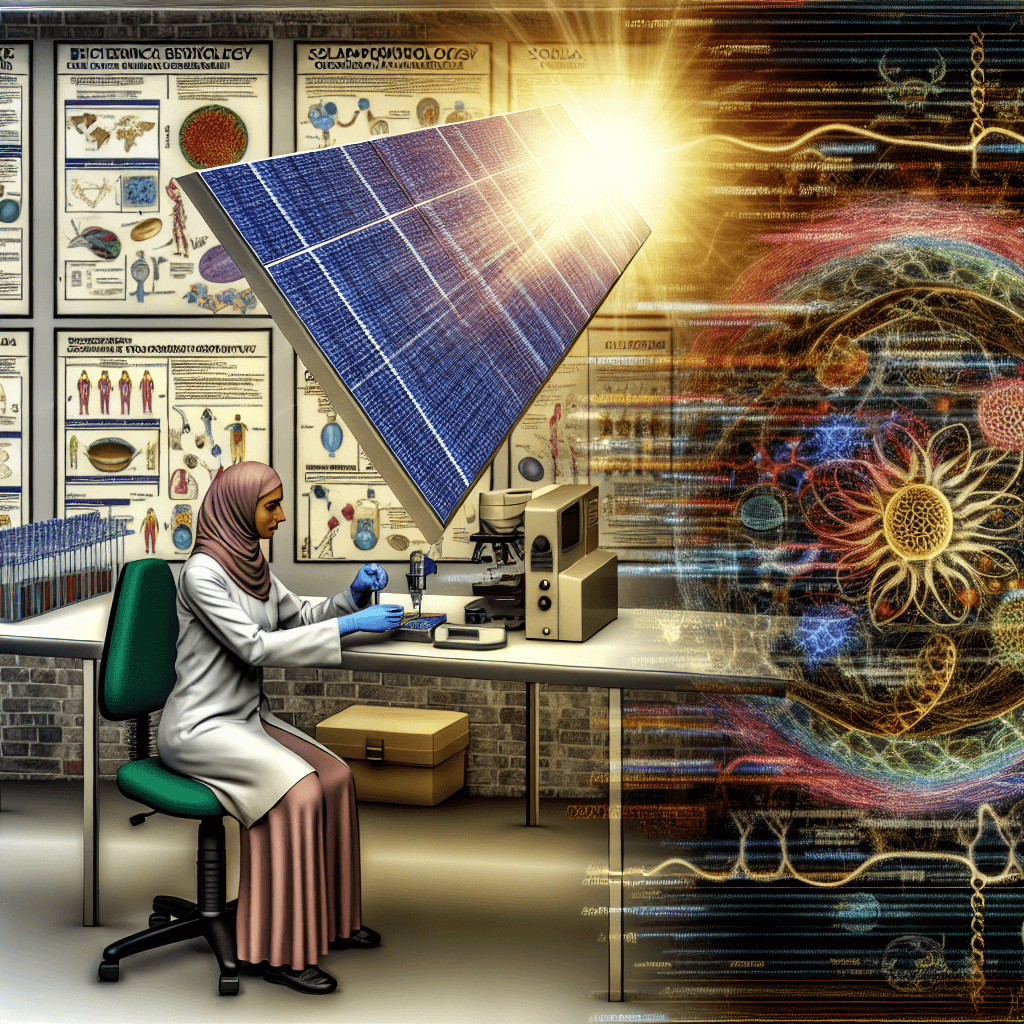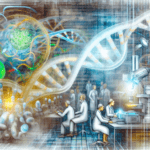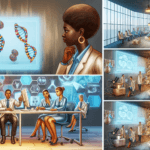Discover how biotechnology is revolutionizing healthcare with sustainable solutions that benefit both people and the planet. Learn more now.
How Biotechnology is Pioneering Sustainable Healthcare Solutions

Table of Contents
“Revolutionizing healthcare through sustainable biotechnology innovations.”
Introduction
Biotechnology is a rapidly advancing field that combines biology and technology to develop innovative solutions for various industries, including healthcare. In recent years, biotechnology has been at the forefront of pioneering sustainable healthcare solutions. These solutions aim to improve the quality of healthcare while also promoting environmental sustainability. Through the use of biotechnology, researchers and scientists are able to develop new treatments, medicines, and technologies that not only benefit patients but also minimize the impact on the environment. In this introduction, we will explore how biotechnology is revolutionizing the healthcare industry and leading the way towards a more sustainable future.
The Role of Biotechnology in Developing Sustainable Vaccines
Biotechnology has been at the forefront of developing sustainable solutions for various industries, including healthcare. With the increasing global population and the rise of infectious diseases, the demand for vaccines has never been higher. However, traditional methods of vaccine production have been associated with high costs, long production times, and limited scalability. This is where biotechnology comes in, offering innovative and sustainable solutions for vaccine development.
One of the key roles of biotechnology in healthcare is the development of sustainable vaccines. These vaccines are not only effective in preventing diseases but also have a minimal impact on the environment and are economically feasible. Biotechnology has revolutionized the way vaccines are produced, making the process more efficient, cost-effective, and environmentally friendly.
One of the main ways biotechnology has contributed to sustainable vaccine development is through the use of recombinant DNA technology. This technology involves the insertion of a gene from a pathogen into a harmless microorganism, such as bacteria or yeast, to produce a vaccine. This method eliminates the need for using live pathogens, which can be dangerous and difficult to handle. It also reduces the risk of contamination and ensures a consistent and safe vaccine product.
Moreover, biotechnology has enabled the production of vaccines in large quantities through the use of bioreactors. These are large-scale fermentation tanks that provide an ideal environment for microorganisms to grow and produce the desired vaccine. This method is not only more efficient but also reduces the need for land and resources, making it a more sustainable option.
Another significant contribution of biotechnology to sustainable vaccine development is the use of plant-based vaccines. This involves the genetic modification of plants to produce specific proteins that can act as antigens, triggering an immune response in the body. This method has several advantages, including lower production costs, faster production times, and the ability to produce vaccines in areas where traditional methods are not feasible. It also eliminates the need for refrigeration during transportation and storage, making it a more sustainable option for developing countries with limited resources.
In addition to the production of vaccines, biotechnology has also played a crucial role in vaccine delivery. One example is the use of microneedle patches, which are small patches containing tiny needles that can painlessly penetrate the skin and deliver the vaccine. This method is not only more convenient and less invasive but also eliminates the need for trained healthcare professionals, making it a more sustainable option for mass vaccination campaigns.
Furthermore, biotechnology has also contributed to the development of adjuvants, which are substances added to vaccines to enhance their effectiveness. Adjuvants can reduce the amount of antigen needed in a vaccine, making it more cost-effective and sustainable. They can also improve the immune response, reducing the number of doses required for a vaccine, and ultimately reducing the environmental impact of vaccine production.
In conclusion, biotechnology has played a crucial role in developing sustainable solutions for vaccine production and delivery. Through the use of recombinant DNA technology, bioreactors, plant-based vaccines, and innovative delivery methods, biotechnology has made vaccines more efficient, cost-effective, and environmentally friendly. These advancements have not only improved access to vaccines but also reduced the environmental impact of their production. As we continue to face global health challenges, biotechnology will undoubtedly continue to pioneer sustainable solutions for healthcare.
Advancements in Biotechnology for Sustainable Antibiotic Production

Biotechnology has been at the forefront of revolutionizing healthcare solutions, particularly in the production of antibiotics. With the rise of antibiotic resistance and the need for sustainable practices, biotechnology has played a crucial role in developing innovative solutions to address these challenges.
One of the key advancements in biotechnology for sustainable antibiotic production is the use of bioreactors. These are large-scale fermentation tanks that use microorganisms to produce antibiotics. This method is not only more efficient and cost-effective, but it also reduces the environmental impact of antibiotic production.
Traditionally, antibiotics were produced through chemical synthesis, which required large amounts of energy and resources. This process also generated a significant amount of waste, contributing to environmental pollution. Bioreactors, on the other hand, use renewable resources such as plant-based sugars and waste products from other industries, making the production process more sustainable.
Moreover, bioreactors allow for the production of antibiotics in a controlled environment, ensuring consistent quality and purity. This is crucial in the pharmaceutical industry, where even slight variations in the composition of a drug can have significant consequences. Bioreactors also have the potential to produce antibiotics at a larger scale, meeting the growing demand for these life-saving drugs.
Another significant advancement in biotechnology for sustainable antibiotic production is the use of genetic engineering. This technique involves manipulating the genetic material of microorganisms to produce specific antibiotics. By modifying the genetic code, scientists can enhance the production of antibiotics, making the process more efficient and reducing the need for large quantities of raw materials.
Genetic engineering also allows for the production of new antibiotics that are more effective against resistant bacteria. This is crucial in the fight against antibiotic resistance, as traditional antibiotics are becoming less effective against certain strains of bacteria. By creating new antibiotics, biotechnology is providing a sustainable solution to combat this global health threat.
In addition to producing antibiotics, biotechnology has also made significant advancements in the development of diagnostic tools for antibiotic resistance. These tools use biotechnology techniques such as DNA sequencing to identify specific genetic markers associated with antibiotic resistance. This allows for the rapid and accurate detection of resistant bacteria, enabling healthcare professionals to prescribe the most effective treatment for their patients.
Furthermore, biotechnology has also played a crucial role in the development of alternative treatments to antibiotics. One such example is the use of bacteriophages, which are viruses that specifically target and kill bacteria. Bacteriophages have been used for decades in Eastern Europe as an alternative to antibiotics, and biotechnology has allowed for their production on a larger scale. This not only provides a sustainable alternative to antibiotics but also reduces the risk of antibiotic resistance.
In conclusion, biotechnology has made significant advancements in the production of antibiotics, making the process more sustainable and efficient. Through the use of bioreactors, genetic engineering, and the development of alternative treatments, biotechnology is providing innovative solutions to address the challenges of antibiotic resistance and sustainability in healthcare. As technology continues to advance, we can expect even more groundbreaking developments in the field of biotechnology, paving the way for a healthier and more sustainable future.
Biotechnology’s Impact on Sustainable Medical Devices and Equipment
Biotechnology has been making significant strides in the field of healthcare, not only in terms of developing new treatments and medicines, but also in creating sustainable solutions for medical devices and equipment. With the increasing focus on sustainability and environmental responsibility, the healthcare industry has been under pressure to reduce its carbon footprint and find more eco-friendly alternatives. Biotechnology has emerged as a key player in this effort, with its innovative approaches and cutting-edge technologies.
One of the major areas where biotechnology has made a significant impact is in the development of sustainable medical devices and equipment. Traditional medical devices and equipment are often made from non-biodegradable materials, such as plastics and metals, which can have a detrimental effect on the environment. These materials take hundreds of years to decompose, and their production also contributes to greenhouse gas emissions. Biotechnology offers a solution to this problem by utilizing biodegradable and renewable materials in the production of medical devices.
One example of this is the use of bioplastics in medical devices. Bioplastics are derived from renewable sources such as corn starch, sugarcane, and vegetable oils, making them a more sustainable alternative to traditional plastics. These bioplastics can be used to create a wide range of medical devices, from syringes and surgical instruments to prosthetics and implants. Not only are these devices biodegradable, but they also have a lower carbon footprint compared to their traditional counterparts.
In addition to using biodegradable materials, biotechnology has also revolutionized the production process of medical devices. Traditional manufacturing methods often involve the use of harsh chemicals and generate a significant amount of waste. Biotechnology offers a more sustainable approach by utilizing bioprocessing techniques, which use microorganisms to produce materials and products. This not only reduces the use of harmful chemicals but also minimizes waste production. Furthermore, bioprocessing can also be done using renewable energy sources, making the entire production process more sustainable.
Another area where biotechnology has made a significant impact is in the development of smart medical devices. These devices are equipped with sensors and microchips that can collect and transmit data, allowing for real-time monitoring of a patient’s health. This technology has the potential to reduce the need for frequent hospital visits, thereby reducing carbon emissions from transportation. Additionally, smart medical devices can also help in early detection and prevention of diseases, leading to better health outcomes and reduced healthcare costs.
Biotechnology has also played a crucial role in the development of sustainable diagnostic tools. Traditional diagnostic methods often involve the use of chemicals and generate a significant amount of waste. Biotechnology offers a more sustainable approach by utilizing biosensors, which use biological components to detect and measure various substances. These biosensors are not only more environmentally friendly but also more sensitive and accurate compared to traditional methods. They also have the potential to be used in point-of-care testing, reducing the need for samples to be transported to a laboratory, and thus reducing carbon emissions.
In conclusion, biotechnology has made significant contributions to the development of sustainable medical devices and equipment. From utilizing biodegradable materials to implementing more eco-friendly production processes, biotechnology has paved the way for a more sustainable healthcare industry. With its continued advancements and innovations, biotechnology is set to play an even bigger role in creating a greener and more sustainable future for healthcare.
How Biotechnology is Revolutionizing Sustainable Treatment for Chronic Diseases
Biotechnology has been making significant strides in the field of healthcare, particularly in the development of sustainable treatment options for chronic diseases. Chronic diseases, such as diabetes, cancer, and cardiovascular diseases, are responsible for a large portion of global deaths and healthcare costs. These diseases require long-term management and treatment, which can have a significant impact on the environment and contribute to the growing issue of unsustainable healthcare practices. However, with the advancements in biotechnology, sustainable solutions are being pioneered to address these challenges.
One of the key ways biotechnology is revolutionizing sustainable treatment for chronic diseases is through the development of biopharmaceuticals. Biopharmaceuticals are drugs that are produced using living organisms, such as bacteria or yeast, to create proteins that can treat diseases. These drugs have several advantages over traditional pharmaceuticals, including a lower environmental impact. Traditional pharmaceuticals are often synthesized using chemical processes that can produce harmful by-products and require large amounts of energy and resources. In contrast, biopharmaceuticals are produced using renewable resources and have a lower carbon footprint.
Furthermore, biopharmaceuticals have the potential to be more effective and have fewer side effects compared to traditional pharmaceuticals. This is because they are designed to target specific molecules in the body, resulting in a more targeted and precise treatment. This not only improves patient outcomes but also reduces the amount of medication needed, leading to less waste and a more sustainable approach to treatment.
Another way biotechnology is pioneering sustainable healthcare solutions is through the development of personalized medicine. Personalized medicine involves tailoring treatments to an individual’s genetic makeup, lifestyle, and environment. This approach allows for more effective and efficient treatment, reducing the need for multiple medications and minimizing the risk of adverse reactions. By targeting the specific needs of each patient, personalized medicine can also reduce the amount of medication waste and unnecessary treatments, making it a more sustainable option.
In addition to biopharmaceuticals and personalized medicine, biotechnology is also playing a crucial role in the development of medical devices and technologies that are more sustainable. For instance, biodegradable medical implants are being developed using biodegradable polymers that can be safely absorbed by the body over time. This eliminates the need for additional surgeries to remove the implant, reducing the environmental impact and healthcare costs.
Moreover, biotechnology is also being used to develop sustainable diagnostic tools. For example, biosensors are being developed that can detect diseases and monitor health parameters using biological molecules. These biosensors are more sensitive, accurate, and cost-effective compared to traditional diagnostic tools, making them a more sustainable option for disease detection and management.
Furthermore, biotechnology is also being utilized to develop sustainable methods for drug delivery. Nanotechnology, which involves the use of tiny particles, is being used to deliver drugs to specific targets in the body. This targeted drug delivery approach reduces the amount of medication needed and minimizes the risk of side effects, making it a more sustainable option for treatment.
In conclusion, biotechnology is pioneering sustainable healthcare solutions by revolutionizing the treatment of chronic diseases. Through the development of biopharmaceuticals, personalized medicine, sustainable medical devices and technologies, and innovative drug delivery methods, biotechnology is addressing the challenges of unsustainable healthcare practices. These advancements not only improve patient outcomes but also have a positive impact on the environment and reduce healthcare costs. As biotechnology continues to evolve, it has the potential to transform the healthcare industry and pave the way for a more sustainable future.
Q&A
1. What is biotechnology?
Biotechnology is the use of living organisms or their components to create useful products or processes. It involves the manipulation of biological systems for practical purposes, such as developing new medicines or improving agricultural crops.
2. How is biotechnology being used in healthcare?
Biotechnology is being used in healthcare to develop new treatments and therapies for diseases, improve diagnostic tools, and create more efficient and sustainable production of medicines. It is also being used to develop personalized medicine, where treatments are tailored to an individual’s genetic makeup.
3. What are some examples of sustainable healthcare solutions developed through biotechnology?
Some examples of sustainable healthcare solutions developed through biotechnology include the production of biodegradable medical devices, the use of genetically modified organisms to produce medicines and vaccines, and the development of renewable energy sources for medical facilities.
4. How is biotechnology helping to address global health challenges?
Biotechnology is helping to address global health challenges by providing innovative solutions for diseases, improving access to affordable medicines, and promoting sustainable practices in healthcare. It is also playing a crucial role in developing treatments and vaccines for emerging infectious diseases and addressing antibiotic resistance.
Conclusion
In conclusion, biotechnology is playing a crucial role in pioneering sustainable healthcare solutions. Through advancements in genetic engineering, biopharmaceuticals, and other biotech innovations, we are seeing the development of more effective and sustainable treatments for various diseases and health conditions. Additionally, biotechnology is also helping to reduce the environmental impact of healthcare by promoting the use of renewable resources and reducing waste. With continued research and development, biotechnology has the potential to revolutionize the healthcare industry and create a more sustainable future for all.








